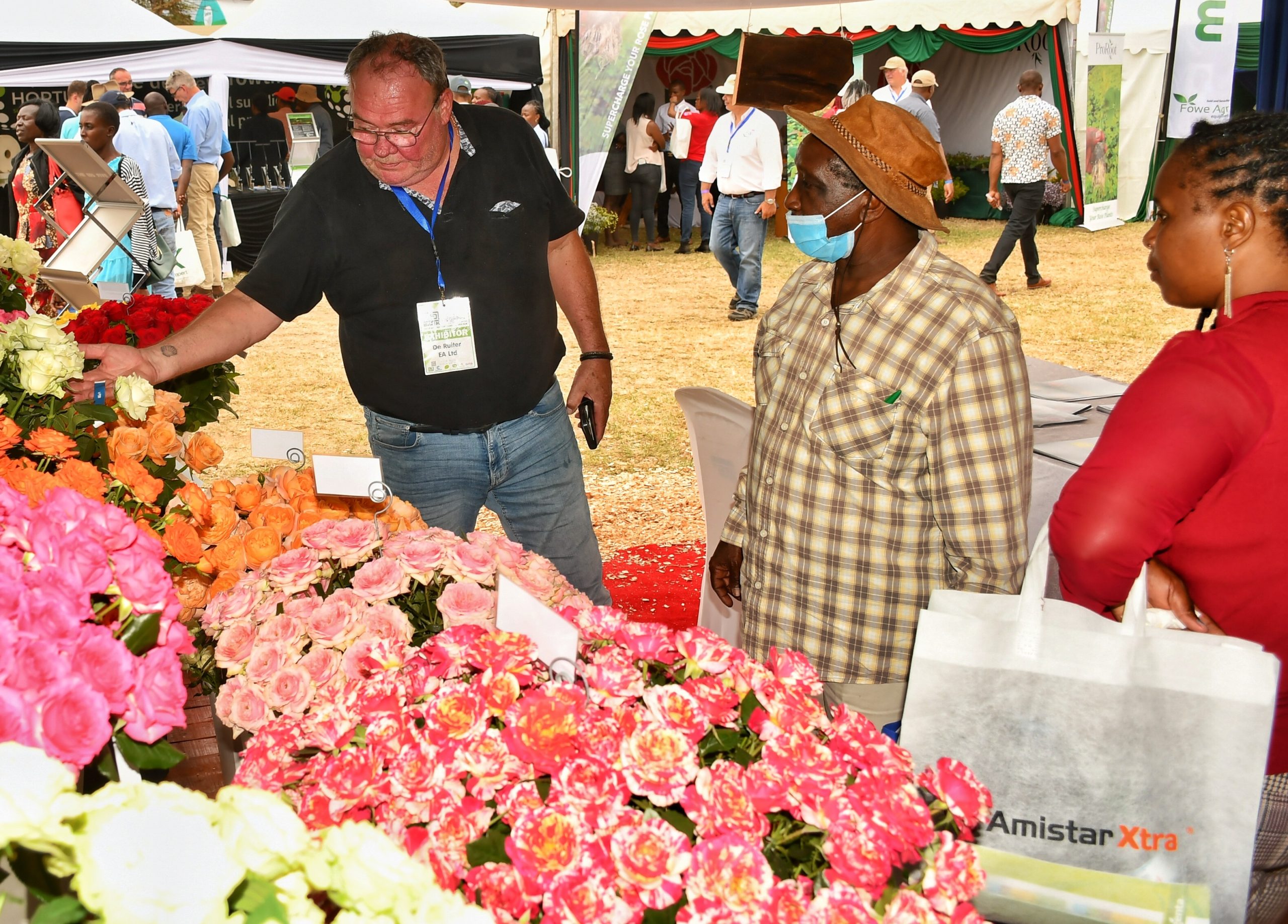Stakeholders in the horticultural export sector have been advised to adhere to the new standards set for the European market in order to continue export their products to the market.
The Chairman of the Naivasha Horticultural Fair Mr. Richard McGonnell said the restrict standards were recently set up by the European Union in order to ensure environmental safety in the face of the rising challenge of climate challenge.
McGonnell however reiterated that said the local growers have started adhering to strict markets demands especially in quality and chemical levels especially those destined for European markets.
Speaking in Naivasha during this year’s edition of the Naivasha Horticulture Trade Fair, McGonnell said that recently some shipments were intercepted and returned to their source counties due to False Codling Moth diseases in the products.
He revealed that the ongoing global conflicts including Israel -Gaza war and the Russia -Ukraine have affected the local horticultural sector in a big way, leading to high cost of production and cost of products destined for European Markets.
“The ongoing global conflicts have hit the transport of Horticultural produces by sea due to attacks along key routes especially along the Red sea as rebel groups increase attacks, forcing exporters to use alternative routes, leading to high freight costs of produces shipped abroad”, said McGonnell.
The chairman noted that earlier reports had indicated that freight charges have increased by more than 50 percent since the start of the war while the shipping time almost tripled.
He was emphatic that the horticultural sector was committed to double sea freight shipments to European Union markets despite the challenges, and wondered why the national carrier; Kenya Airways(KQ) did not have cargo freights to the destination in order to provide alternative transport and reap from the ongoing crises.
The chairman at the same time lamented that despite the recent drop in oil prices in the global markets, the sector is yet to get the much needed relief leading to high cost of production.
McGonnell observed that on the same, the chair said despite the cost of oil falling from USD 98 per barrel to USD 74 per barrel, the local horticultural growers are yet to feel the impact of the global changes which has seen the cost of production to remain high.
He hailed the Kenya Government for providing subsidized fertilizer to farmers which he said had seen food production go up by about 40 per cent and consumption has also gone up, thus impacting on food security and nutrition.
McGonnel however noted that small holder farmers in the need soil testing in order to spur productivity. To this end, he urged the Government to set up set up soil testing centres in various parts of the country for small scale farmers to help the farmers determine the kind of fertilizers to use and which crop to grow for maximum yields.
He said the farmers have used Diammonium Phosphate (DAP) fertilizer for long which has in turn affected the soils.
The Government early this year announced that it will provide seven million bags of subsidized fertilizer to farmers, in all the 1,450 wards across the country for the 2024 long and short rains seasons.
The last two years have seen the Government provide fertilizer subsidies to cushion farmers against the high cost of the commodity. The subsidy programme was followed by a farmer registration exercise, and the deployment of an accurate and transparent e-voucher system, for managing distribution.
The Elgon Kenya Company director Dr. Vimal Kantaria on his part said his company will continue to provide certified seeds and echo-friendly farm inputs and chemicals to the horticulture sector in line with the changing needs in the market and emerging issues of climate change.
The horticulture sub-sector which includes vegetables, flowers, fruits and medicinal aromatic plants is among the key sectors of agriculture in Kenya contributing to foreign exchange, household incomes and food and nutrition security. It employs about 6.5 million Kenyans directly and indirectly.
Horticulture is the largest sub-sector of agriculture, contributing 33 per cent of the Agricultural Gross Domestic Product (GDP). Horticulture industry is made up of five commodities: vegetables (accounting for 44.6 per cent of the total value of produce); flowers (20.3 per cent), fruits (29.6 per cent), nuts and; medicinal and aromatic plants (MAPS) at 5.8 per cent).
The floriculture sector alone directly impacts the livelihoods of over two million Kenyans and has employed over 200,000 people directly. Production is centered on the Great Rift Valley, in Lake Naivasha, Mount Kenya and Nairobi among other areas in the country.
The total area under horticulture is estimated at 496,062 Hectares. The total area under horticulture is estimated at 496,062 Ha with production of 7.9 million Metric Tons. Roses account for the largest share of flowers export.
Horticulture export earnings increased by 6.5 percent in 2023, driven by increased volumes and a weak shilling. Data from the Horticulture Crops Directorate (HCD) shows earnings grew to Sh156. 69 billion last year, marking a growth from Sh.147. 1 billion in the previous year of 2022.
The major challenged facing the horticulture farming rae; lack of market, lack of market information, stiff competition, lack of marketing skills and distance to potential markets, lack of market access due to poor roads, high youth’s exploitation by middle men, lack of marketing skills and low prices.




